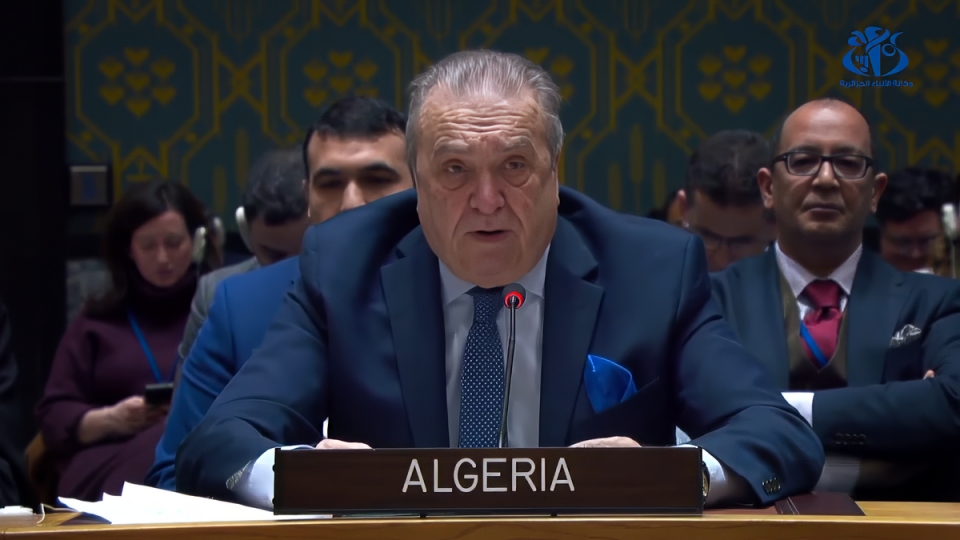By Riad Beladi
In recent months, Algeria has demonstrated remarkable and assertive diplomacy on the international stage, particularly within the United Nations Security Council (UNSC). Algeria’s robust support for the membership of the State of Palestine in the UN and its vigorous advocacy for a ceasefire in Gaza have garnered significant global attention and commendation.
Algeria’s Stance on Palestinian Membership
Algeria has long been a steadfast supporter of Palestinian self-determination and statehood. This commitment was prominently displayed in its recent actions at the UNSC, where Algeria played a pivotal role in pushing for the recognition of Palestine as a full member state of the United Nations. The Algerian delegation, leveraging its diplomatic prowess, rallied support from various member states, highlighting the importance of Palestinian sovereignty for regional stability and justice.
Ambassador Abdelkader Bensalah, Algeria’s representative at the UN, made impassioned appeals, underscoring the historical and moral imperatives for recognizing Palestinian statehood. His speeches resonated deeply with many delegations, who echoed Algeria’s calls for a fair and equitable resolution to the Israeli-Palestinian conflict.
Advocacy for Gaza Ceasefire
In addition to championing Palestinian statehood, Algeria has been at the forefront of calls for an immediate and lasting ceasefire in Gaza. The escalation of violence in Gaza has resulted in a humanitarian crisis, with significant civilian casualties and widespread destruction. Algeria’s diplomacy has been instrumental in galvanizing international efforts to halt the violence and address the dire humanitarian situation.
During emergency sessions of the UNSC, Algeria consistently pushed for resolutions demanding an end to hostilities. Its proposals emphasized the need for protecting civilian lives, ensuring humanitarian access, and facilitating dialogue between the conflicting parties. Algeria’s relentless pursuit of peace in Gaza culminated in a landmark resolution that called for an immediate ceasefire, which was widely hailed as a diplomatic victory.
Broader Implications and Global Response
Algeria’s diplomatic maneuvers have not only advanced the cause of Palestinian statehood and peace in Gaza but have also strengthened its position as a leading voice in the Arab world and within the Non-Aligned Movement. Algeria’s ability to build coalitions and navigate the complex dynamics of the UNSC underscores its growing influence and diplomatic acumen.
The international community’s response to Algeria’s initiatives has been overwhelmingly positive. Many countries, including those outside the Arab and Muslim worlds, have expressed support for Algeria’s efforts. This broad-based backing reflects a growing consensus on the need for a just resolution to the Israeli-Palestinian conflict and an end to the cyclical violence in Gaza.
Challenges and Future Prospects
Despite these diplomatic successes, significant challenges remain. The path to full UN membership for Palestine is fraught with political hurdles, including opposition from powerful member states with veto power in the UNSC. Similarly, ensuring a durable ceasefire in Gaza requires sustained international engagement and pressure on all parties involved.
Algeria, however, remains undeterred. Its leadership has pledged to continue advocating for Palestinian rights and pursuing peace in the Middle East. As Algeria prepares to assume a more prominent role in international diplomacy, its actions in the UNSC serve as a testament to its commitment to justice, peace, and solidarity.
Conclusion
Algeria’s extraordinary and dominating diplomacy at the United Nations Security Council highlights its critical role in addressing some of the most pressing issues in the Middle East. By championing Palestinian statehood and advocating for a ceasefire in Gaza, Algeria has reaffirmed its dedication to peace and justice. The international community will undoubtedly continue to watch Algeria’s diplomatic efforts with keen interest, as it seeks to navigate the complex landscape of global politics and uphold the principles of the United Nations.



